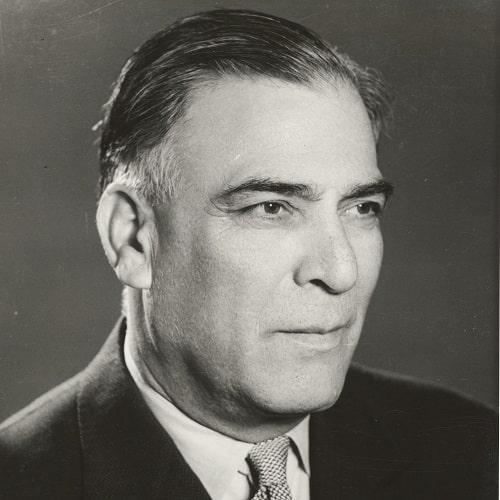Wajid Ali Burki specialized in ophthalmology, but he had wider interests and an exceptional talent which insured his success in administrative services to his country at the highest level.
He was born in Basti Baba Khel, Jullundur, where his father Jehan Khan Burki was a landowner. He received his early education in North West India (later Pakistan), at the Government School, Jullundur, and the Forman Christian School, and then came to the UK to study medicine at St Andrews.
After graduation he worked as junior clinical assistant at the Royal London Ophthalmic Hospital from 1924 to March 1925 and then as senior clinical assistant. He obtained his MD in 1926 and in 1927 he joined the Indian Medical Service (Army) as a lieutenant working in military hospitals at Jullundur, Bakloh, Quetta and Karachi. He returned to the UK in 1932 and obtained his DOMS that year. Back in India in 1933, he was appointed eye specialist to the Eastern Command at Meerut. He married Iqbal Khanum, daughter of Khan Bahadur Ahmad Hasan Khan, a civil servant, in 1935 and they had five children - three sons and a daughter.
With the advent of the second world war Burki was promoted lieutenant colonel, given command of a field ambulance in the 5th Indian Division, and saw active service in the East African campaign from 1940-41. From 1941-42 he was acting assistant director medical services 5th Indian Division, seeing action in the Western Desert. He was awarded the MBE for distinguished services, promoted to full colonel in 1942, and took over as assistant director medical services 7th Indian Division serving in the Burma campaign, during which time he was primarily responsible for the control and very low incidence of malaria and other infectious diseases amongst British and Indian soldiers. He was twice mentioned in despatches, first during the East African campaign and then for his participation in the siege of the ‘Admin Box’ in the Arakan; he also took part in the Kohima Imphal campaign. He was awarded the CBE for distinguished services.
After independence in 1947 he opted for Pakistan and became the first deputy director of the Army Medical Corps. He was promoted major general in 1952 and appointed director of medical services (Army). In 1953 he was promoted to lieutenant general and appointed director-general of the Armed Forces Medical Services.
Burki nurtured the Armed Forces Pathological Laboratory, now the Armed Forces Institute of Pathology, and the Armed Forces Postgraduate Medical College. In 1958, when Pakistan came under martial law, he again changed his career. He was invited to become Minister for Health, Labour and Social Welfare. In this capacity he established the rural health scheme which exists today; he implemented numerous public health schemes - village dispensaries, eradication of malaria and smallpox, control of tuberculosis, the setting up of ‘eye camps’ etc. He brought about equitable labour laws and changes in social welfare which still form the basis of new laws in Pakistan. From 1962-64 he was Pakistan’s ambassador to the Scandinavian countries.
In 1962 he was instrumental in founding the College of Physicians and Surgeons of Pakistan, embracing all the medical specialties, and was elected as first president. Each following year the Fellows re-elected him as president, and he held this position at the time of his death. His hard work and enthusiasm grew with the years and the College became a lively and happy campus, providing postgraduate teaching and examinations, from basic sciences to modern specialties.
Burki was a tall and handsome man who commanded respect. A strict disciplinarian, punctilious in detail, courteous in manner, he deserved and received total and willing obedience from all who served under him.
In his retirement he lived in Rawalpindi and reminisced about ‘the old days’, but at heart he was a country gentleman. Whether it was at his country home in the Murree hills, or on his land in southern Sindh, he enjoyed indulging in shooting and fishing. Indeed he had a fund of fisherman’s tales. He also bred cattle and introduced the Jersey strain to Pakistan. In addition, he had a keen interest in horses and was chairman of the Rawalpindi Race Club and steward of the Jockey Club in Pakistan.
Wajid Ali Burki achieved eminence in every field that he was called upon to play a part in. For a few weeks he even served as acting president of Pakistan; yet he had humility and respect for his superiors. When a former commanding officer of his, who had retired with the rank of lieutenant colonel, celebrated his 80th birthday, Burki arranged a dinner for him at which five past or present director-generals of the Armed Forces Medical Corps were present. When the guest of honour arrived, all five - led by Burki - stood to attention and gave him a salute. He was a great family man and supported loyally by his wife; spending his life trying to improve the status and standing of medicine in Pakistan. Two of his sons continue in the family tradition of administrative service to Pakistan. Another son, Nausherwan Khan Burki, is a Fellow of the College and a chest specialist in the medical centre of the University of Kentucky, USA. Burki was also proud of the fact that one of his sons, and two of his nephews have been captains of the Pakistan test cricket team; one of them, Imran Khan, still plays as captain.
R B Khambatta
[The Lancet, 1989,1,510; Pakistan Times, 28 Feb 1989]

